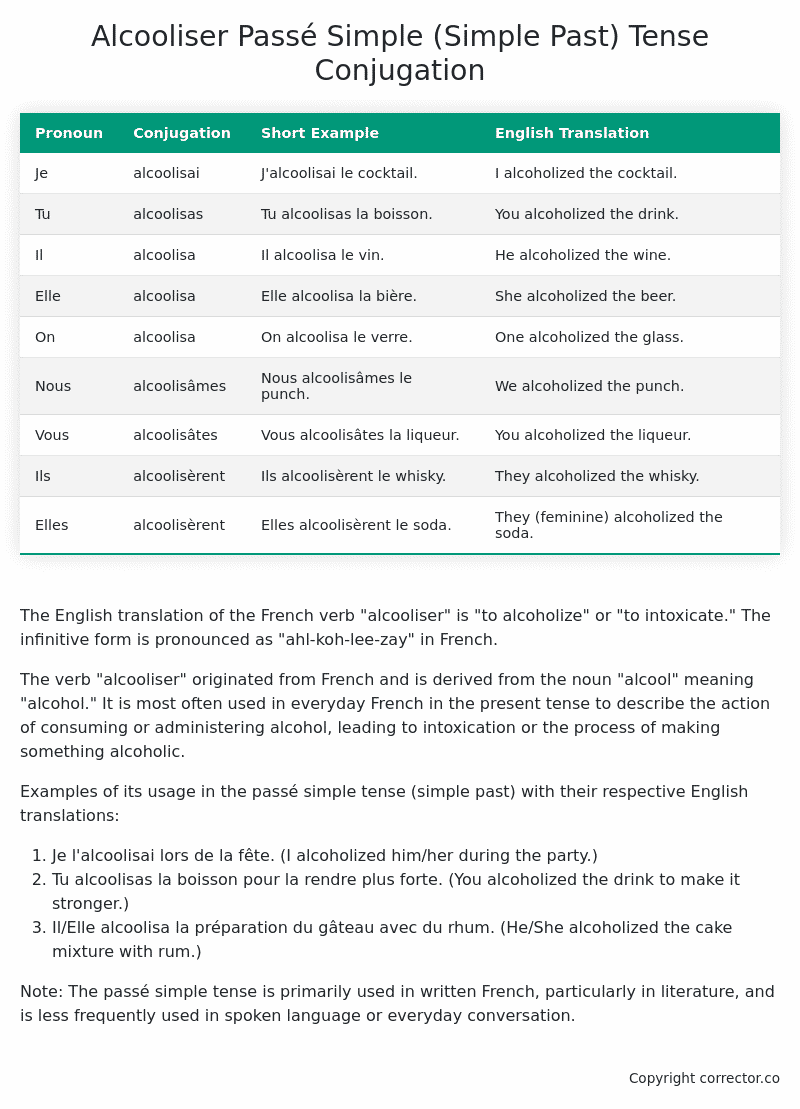Passé Simple (Simple Past) Tense Conjugation of the French Verb alcooliser
Introduction to the verb alcooliser
The English translation of the French verb “alcooliser” is “to alcoholize” or “to intoxicate.” The infinitive form is pronounced as “ahl-koh-lee-zay” in French.
The verb “alcooliser” originated from French and is derived from the noun “alcool” meaning “alcohol.” It is most often used in everyday French in the present tense to describe the action of consuming or administering alcohol, leading to intoxication or the process of making something alcoholic.
Examples of its usage in the passé simple tense (simple past) with their respective English translations:
- Je l’alcoolisai lors de la fête.
(I alcoholized him/her during the party.) - Tu alcoolisas la boisson pour la rendre plus forte.
(You alcoholized the drink to make it stronger.) - Il/Elle alcoolisa la préparation du gâteau avec du rhum.
(He/She alcoholized the cake mixture with rum.)
Note: The passé simple tense is primarily used in written French, particularly in literature, and is less frequently used in spoken language or everyday conversation.
Table of the Passé Simple (Simple Past) Tense Conjugation of alcooliser
| Pronoun | Conjugation | Short Example | English Translation |
|---|---|---|---|
| Je | alcoolisai | J’alcoolisai le cocktail. | I alcoholized the cocktail. |
| Tu | alcoolisas | Tu alcoolisas la boisson. | You alcoholized the drink. |
| Il | alcoolisa | Il alcoolisa le vin. | He alcoholized the wine. |
| Elle | alcoolisa | Elle alcoolisa la bière. | She alcoholized the beer. |
| On | alcoolisa | On alcoolisa le verre. | One alcoholized the glass. |
| Nous | alcoolisâmes | Nous alcoolisâmes le punch. | We alcoholized the punch. |
| Vous | alcoolisâtes | Vous alcoolisâtes la liqueur. | You alcoholized the liqueur. |
| Ils | alcoolisèrent | Ils alcoolisèrent le whisky. | They alcoholized the whisky. |
| Elles | alcoolisèrent | Elles alcoolisèrent le soda. | They (feminine) alcoholized the soda. |
Other Conjugations for Alcooliser.
Le Present (Present Tense) Conjugation of the French Verb alcooliser
Imparfait (Imperfect) Tense Conjugation of the French Verb alcooliser
Passé Simple (Simple Past) Tense Conjugation of the French Verb alcooliser (You’re reading it right now!)
Passé Composé (Present Perfect) Tense Conjugation of the French Verb alcooliser
Futur Simple (Simple Future) Tense Conjugation of the French Verb alcooliser
Futur Proche (Near Future) Tense Conjugation of the French Verb alcooliser
Plus-que-parfait (Pluperfect) Tense Conjugation of the French Verb alcooliser
Passé Antérieur (Past Anterior) Tense Conjugation of the French Verb alcooliser
Futur Antérieur (Future Anterior) Tense Conjugation of the French Verb alcooliser
Subjonctif Présent (Subjunctive Present) Tense Conjugation of the French Verb alcooliser
Subjonctif Passé (Subjunctive Past) Tense Conjugation of the French Verb alcooliser
Subjonctif Imparfait (Subjunctive Imperfect) Tense Conjugation of the French Verb alcooliser
Subjonctif Plus-que-parfait (Subjunctive Pluperfect) Tense Conjugation of the French Verb alcooliser
Conditionnel Présent (Conditional Present) Tense Conjugation of the French Verb alcooliser
Conditionnel Passé (Conditional Past) Tense Conjugation of the French Verb alcooliser
Conditionnel Passé II (Conditional Past II) Tense Conjugation of the French Verb alcooliser
L’impératif Présent (Imperative Present) Tense Conjugation of the French Verb alcooliser
L’impératif Passé (Imperative Past) Tense Conjugation of the French Verb alcooliser
L’infinitif Présent (Infinitive Present) Tense Conjugation of the French Verb alcooliser
L’infinitif Passé (Infinitive Past) Tense Conjugation of the French Verb alcooliser
Le Participe Présent (Present Participle) Tense Conjugation of the French Verb alcooliser
Le Participe Passé (Past Participle) Tense Conjugation of the French Verb alcooliser
Struggling with French verbs or the language in general? Why not use our free French Grammar Checker – no registration required!
Get a FREE Download Study Sheet of this Conjugation 🔥
Simply right click the image below, click “save image” and get your free reference for the alcooliser Passé Simple tense conjugation!

Alcooliser – About the French Passé Simple (Simple Past) Tense
Formation
Usage
Narration
Historical Context
Interactions with other tenses
Passé Composé
Imparfait
Conditional and Subjunctive
Summary
I hope you enjoyed this article on the verb alcooliser. Still in a learning mood? Check out another TOTALLY random French verb conjugation!


